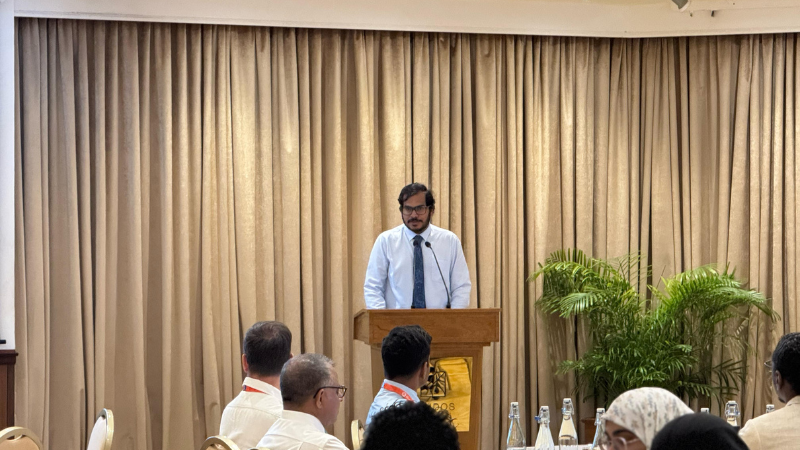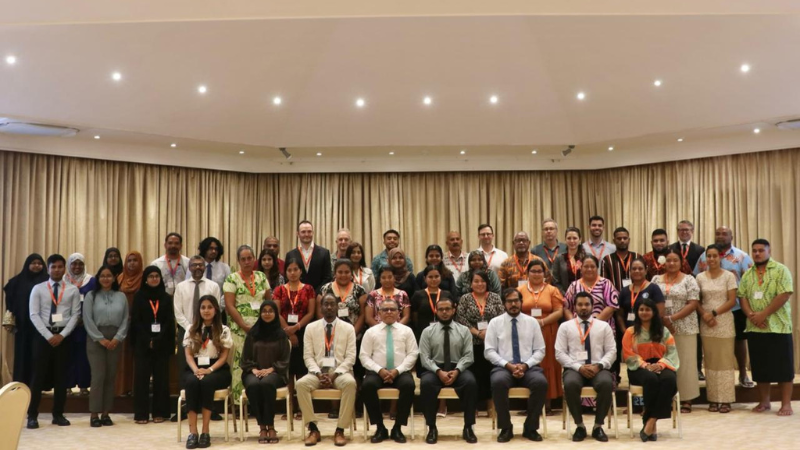MALÉ, MALDIVES, 22 April, 2025 — From April 22-24 the Republic of Maldives, as Chair of the Coalition of Atoll Nations on Climate Change (CANCC), is hosting its peer atoll nations in Bandos Maldives for a discussion focused on climate change, nature-based solutions and food security.
Representatives from the 5 CANCC member countries, Kiribati, the Maldives, the Republic of the Marshall Islands, Tokelau, and Tuvalu are participating in the second workshop for CANCC on adaptation, coming together in an effort to strengthen national responses to their unique climate change vulnerabilities and risks.
The peer-learning event is supported by the National Adaptation Plan Global Network and focuses on how countries are building resilience to climate change through national adaptation plan (NAP) processes. All CANCC member nations have NAP processes underway at various stages.
“As vulnerable low-lying atoll nations, effective and timely adaptation is not optional for us; it is essential. National Adaptation Plans are one of the most strategic tools we have, to steer our responses in the face of climate challenges. And within these plans, nature-based solutions are increasingly gaining the recognition they deserve”, said Minister of State for Tourism and Environment, H.E Ibrahim Mimrah, speaking on behalf of the Chair of CANCC, the Minister of Tourism and Environment of the Maldives, H.E. Thoriq Ibrahim.

“This event marks a continuation of our shared journey of learning from one another, and our commitment to deepening collaboration among atoll nations. We are creating space for the voices and solutions of atoll nations to influence the global adaptation and resilience agenda,” said Minister of State H.E. Ibrahim Mimrah.
The goal of the workshop is to facilitate open and honest technical discussions from CANCC members on their NAP processes, with a focus on nature-based solutions and food security. The workshop also aims to encourage ongoing exchange between atoll nations’ governments countries on the challenges and opportunities of climate change adaptation in their unique geographic contexts.
According to the Intergovernmental Panel on Climate Change, even under lower emission scenarios, sea-level rise will be unavoidable for low-lying islands. It has also long been recognised that islands on coral atolls are particularly vulnerable to the impacts of climate change, with some experts arguing that the risk from climate-induced factors could even undermine the islands’ long-term viability and sovereignty.
“Every day, atoll nations and other Small Island Developing States are having to deal with the true extent of the damage caused by climate change,” said Dr. Orville Grey, Head of Secretariat for the NAP Global Network.
“But through national adaptation plan processes, countries can put adaptation at the heart of decision-making. Countries can drive coordination, set policy priorities, mobilize resources, allocate support, and track progress on achieving their adaptation goals. The NAP Global Network has been a longstanding partner and technical ally of CANCC countries in this work, and we’re honoured to be facilitating this event,” Grey said.

The NAP Global Network helps accelerate climate change adaptation efforts around the world by supporting developing countries in advancing their NAP processes.
Peer learning is a key pillar of the network’s support, and it has over 10-years’ experience convening dynamic South-South events for open, honest conversations about what’s working and what’s not working in NAP processes. This CANCC event is taking place with funding from the Global Affairs Canada.




ENDS
—–
CONTACTS
Media Unit, Ministry of Tourism and Environment
media@environment.gov.mv
Adrian Estanol
Communication Officer, NAP Global Network


